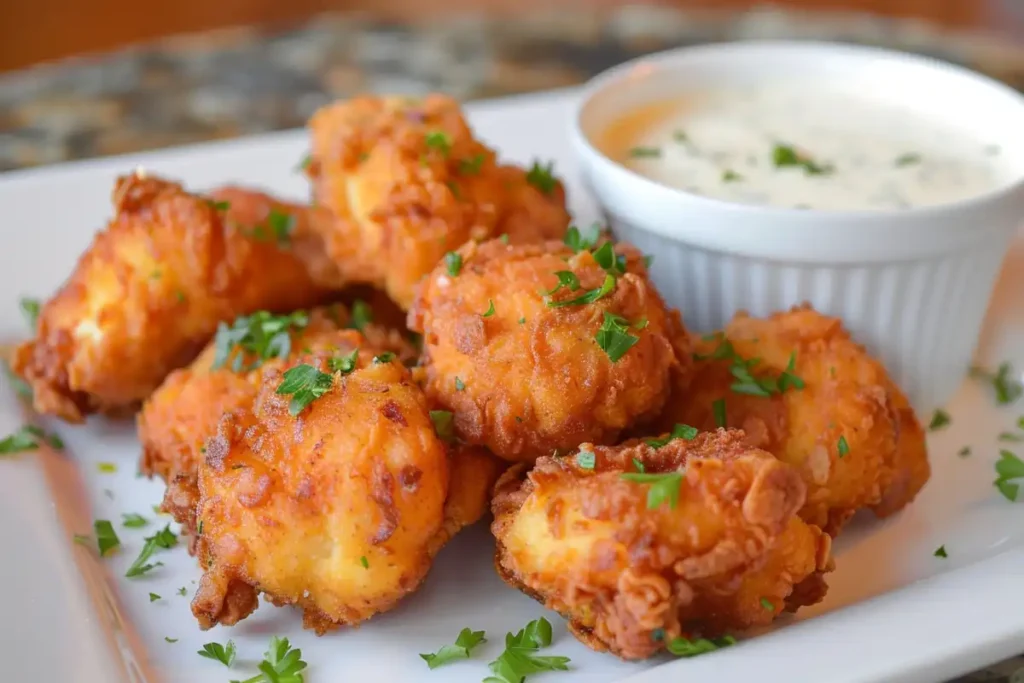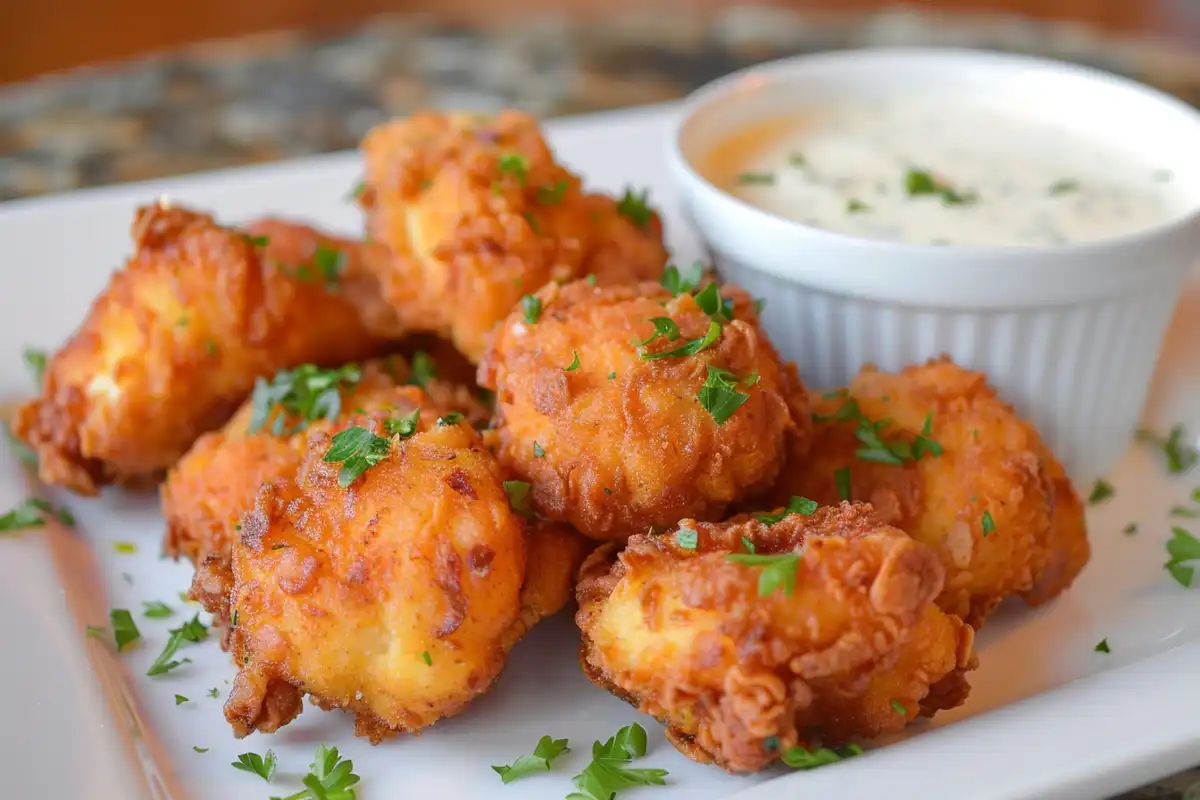Introduction and Basics
Discover why soaking chicken in buttermilk is a culinary game-changer! From tenderizing meat to enhancing flavor, this method has stood the test of time, making it a staple in kitchens worldwide. Learn how it works, its benefits, and practical tips for achieving juicy, flavorful chicken every time.

What Does Soaking in Buttermilk Do to Chicken?
Have you ever thought about why chicken soaked in buttermilk tastes so amazing? It’s not just tradition—it’s a mix of science and flavor. Soaking chicken in buttermilk makes the meat tender, gives it a light tangy taste, and keeps it juicy when cooked. Whether you’re frying chicken or trying out a new recipe, buttermilk is a popular choice for making poultry better.
The process is simple but powerful. The lactic acid in buttermilk softens the chicken by breaking down proteins, giving it a tender and juicy texture. But that’s not all—buttermilk also helps spices stick to the meat, letting flavors soak deep into the chicken. Whether you grill, bake, or fry, buttermilk makes every bite delicious.
The Science Behind Buttermilk as a Marinade
Buttermilk might seem like a simple kitchen ingredient, but it does amazing things for chicken. Its slight acidity makes it a gentle but effective tenderizer. Unlike stronger acids like vinegar or lemon juice, buttermilk’s lactic acid softens the chicken without making it mushy, keeping the texture firm but tender.
Its creamy texture also helps coat the chicken evenly. This means spices like paprika or garlic powder stick to the meat instead of sliding off. As a result, the chicken soaks up all the flavors, making it taste even better.
This combination of tenderizing and flavor-boosting is what makes buttermilk a top choice for marinades. It’s a simple way to get juicy, tasty chicken every time!
How Does Buttermilk Compare to Other Marinades?
There are plenty of marinades to choose from, like citrus-based mixes or yogurt blends. But buttermilk stands out for its perfect balance. Citrus marinades add flavor but can sometimes make chicken too sour or dry. Yogurt is similar to buttermilk but doesn’t have the same smooth texture, which helps coat chicken evenly.
If you want a marinade that works for frying, grilling, or baking, buttermilk is hard to beat. Its gentle acidity softens the meat, while its creamy texture boosts flavor and keeps the chicken juicy. It’s a favorite for home cooks and pros alike!

Benefits of Soaking Chicken in Buttermilk
Tenderizing Chicken Naturally
One of the biggest perks of soaking chicken in buttermilk is how it naturally softens the meat. This happens because lactic acid in buttermilk gently breaks down the chicken’s muscle fibers. Unlike stronger marinades like vinegar or lemon juice that can make chicken too soft or mushy, buttermilk finds the right balance. It makes the chicken tender and juicy while keeping its shape.
Buttermilk’s gentle acidity avoids over-tenderizing, a common issue with stronger acids. Instead, it slowly softens the proteins, creating meat that’s tender but not overdone. This makes it a great choice for recipes like fried chicken, chicken tenders, or grilled kebabs.
Some of the best-known chicken dishes get their juicy texture from this method. Southern-style fried chicken, for example, owes its tenderness to a buttermilk soak. Grilled or roasted chicken breasts marinated in buttermilk come out soft and full of flavor. Simply put, buttermilk helps turn simple chicken recipes into crowd-pleasing meals.
Flavor Enhancement through Buttermilk Soaking
Buttermilk doesn’t just make chicken tender—it adds flavor too. Its creamy texture helps spices like garlic powder, paprika, and black pepper stick to the chicken evenly. This ensures that every bite is packed with flavor.
Buttermilk is also great for layering tastes. You can add rosemary, thyme, or chili flakes to the marinade, and the chicken will soak up the flavors without losing its natural taste. Whether you’re making a Mediterranean dish with oregano and lemon zest or a spiced tandoori marinade with garam masala, buttermilk blends the spices perfectly.
Different cuisines use buttermilk in their own way. In Southern U.S. cooking, it’s a key ingredient for fried chicken. In Middle Eastern recipes, yogurt or buttermilk often adds flavor to spiced kebabs. These examples show how flexible and useful buttermilk is in the kitchen!
Moisture Retention and Juiciness
Buttermilk isn’t just about taste and tenderness—it helps keep chicken moist too. The proteins in buttermilk form a thin layer around the chicken, locking in its juices as it cooks. This is especially helpful when frying, grilling, or baking, which can often dry out the meat.
For fried chicken, buttermilk helps create a crispy outside while keeping the inside juicy. On the grill, it protects the chicken from the high heat, so it doesn’t dry out. Even baking, which can often make lean chicken cuts tough, benefits from the moisture buttermilk adds.
Some people think marinating in buttermilk might make the chicken soggy or bland, but that’s not true. The mild acid in buttermilk works with spices to keep the chicken flavorful and juicy, making it a great choice for any recipe!
Techniques and Applications
Step-by-Step Guide to Soaking Chicken in Buttermilk
Marinating chicken in buttermilk is simple and makes a big difference. Start with fresh chicken—drumsticks, thighs, or even a whole bird. Make sure the chicken is clean and dry. For the marinade, mix buttermilk with spices like garlic powder, paprika, salt, and black pepper. You can also add fresh herbs like rosemary or thyme for extra flavor.
Place the chicken in the marinade, making sure it’s fully covered. Use a glass or plastic container with a lid, as metal bowls can react with the acid in buttermilk. Keep the chicken in the fridge while it marinates. Let it soak for at least 4 hours, or overnight for the best flavor and tenderness. Don’t marinate for more than 24 hours, as it can make the chicken too soft.
Here are a few tips: Make sure the chicken is evenly coated with buttermilk so it cooks evenly. Always throw away the marinade after use to avoid contamination. Before cooking, pat the chicken dry to help it brown and get crispy. Following these steps will give you juicy, flavorful chicken every time!
Popular Recipes Using Buttermilk Soaking
Soaking chicken in buttermilk opens up endless possibilities for delicious recipes. Among the most popular is buttermilk fried chicken, a timeless classic loved for its crispy crust and juicy interior. After marinating, the chicken is dredged in seasoned flour and deep-fried to perfection.
If you’re craving something lighter, grilled buttermilk-marinated chicken is an excellent choice. The buttermilk locks in moisture while the grill imparts a smoky, charred flavor. This dish pairs beautifully with roasted vegetables or a fresh salad.
For a spicier twist, try spicy buttermilk chicken kebabs. Skewer marinated chicken cubes with peppers and onions, then grill or roast them. The buttermilk base keeps the meat tender, while spices like cayenne or chili flakes add a fiery kick. These recipes showcase how buttermilk’s versatility elevates chicken dishes across cooking styles.
Alternatives to Buttermilk
If you’re out of buttermilk or need a non-dairy option, don’t worry. There are simple substitutes that work just as well. One easy choice is to mix regular milk with a tablespoon of vinegar or lemon juice. Let it sit for 5–10 minutes, and you’ll see it thicken and curdle—just like buttermilk.
Another great option is yogurt. Its tangy taste and smooth texture are very close to buttermilk, making it a solid pick for marinades. You can also use kefir, which is a type of fermented milk. It works in the same way, though it might feel a bit thicker than buttermilk when coating chicken.
If you need a vegan alternative, try using non-dairy milk like soy or almond. Add a small amount of vinegar to mimic the acidity of buttermilk. Coconut yogurt is another option. It gives a slight tropical twist to your dish while still tenderizing the meat and adding flavor.
These substitutes are easy to use and give great results, so you don’t need to skip your recipe if buttermilk isn’t available!
FAQs About Soaking Chicken in Buttermilk
Can you soak chicken in buttermilk overnight?
Absolutely! Soaking chicken in buttermilk overnight is a common practice that enhances both tenderness and flavor. The extended time allows the lactic acid in buttermilk to break down proteins gently while infusing the meat with spices and seasonings. For optimal results, marinate the chicken for 12–24 hours in the refrigerator, ensuring it stays fresh and safe to consume.
What is the purpose of buttermilk in chicken?
Buttermilk serves two main purposes: tenderizing and flavoring. Its mild acidity works to soften the chicken’s muscle fibers, resulting in a juicy and tender texture. Simultaneously, it acts as a carrier for spices, allowing seasonings to penetrate the meat more effectively. This dual action makes buttermilk a favorite marinade for achieving moist, flavorful chicken.
How long is too long to brine chicken in buttermilk?
While overnight marination is ideal, leaving chicken in buttermilk for more than 24 hours can lead to over-tenderizing. This extended soak may cause the meat to become mushy and lose its desirable texture. Stick to the 4–24 hour range for the best results.
Why does my breading fall off my buttermilk chicken?
If your breading falls off, the likely culprit is excess moisture. After removing the chicken from the buttermilk, pat it dry gently with paper towels before coating it in flour or breadcrumbs. This ensures the breading adheres properly. Another tip is to let the breaded chicken rest for 10–15 minutes before frying to set the coating.
Buttermilk Soaking for Different Cooking Styles
Does it work better for fried vs. baked chicken?
Buttermilk shines in both methods but has distinct effects. For fried chicken, the buttermilk creates a moist, tender interior while helping the breading adhere and crisp up beautifully. Baked chicken benefits from the retained moisture, ensuring it doesn’t dry out during cooking.
How does buttermilk affect grilling?
When grilling, buttermilk acts as a protective barrier, keeping the chicken juicy despite the high heat. Its tangy flavor pairs wonderfully with the smoky char of the grill, making it an excellent marinade choice for BBQ chicken.
Best practices for air frying buttermilk-marinated chicken
Air frying works particularly well with buttermilk-marinated chicken. The buttermilk ensures the chicken stays moist inside while achieving a crispy exterior. To maximize results, shake off excess buttermilk, coat the chicken evenly with seasoned breadcrumbs, and spray it lightly with oil before air frying.
Conclusion: Why Buttermilk is a Game-Changer for Chicken
Soaking chicken in buttermilk is more than just a cooking trick—it’s a time-tested way to make chicken tastier and easier to cook. The benefits are clear. Buttermilk softens chicken naturally, making every bite juicy and tender. Its mild acid gently breaks down the meat fibers, while its thick texture helps spices stick to the chicken, adding more flavor. Plus, it locks in moisture, so your chicken won’t dry out whether you fry, grill, bake, or air fry it.
Buttermilk’s flexibility is what makes it so special. It’s a key ingredient in Southern fried chicken, works great in marinades for grilling, and adds a twist to kebabs and baked dishes. With buttermilk, even simple chicken meals can become something special—flavorful, tender, and easy to make.
If you haven’t tried soaking chicken in buttermilk yet, give it a go! Start with a basic recipe like fried chicken or grilled buttermilk-marinated chicken. You’ll see how a few simple steps can make a huge difference in taste and texture.
Finally, buttermilk has a rich history in the kitchen. It’s been passed down through generations as a trusted ingredient for making meals warm and comforting. Its long-standing use proves how effective and versatile it really is. Whether you’re cooking a quick dinner or preparing food for a special occasion, buttermilk can help you create dishes that everyone will love.
Try using buttermilk today—it’s a simple way to take your chicken meals to the next level. Your family and friends will thank you!

